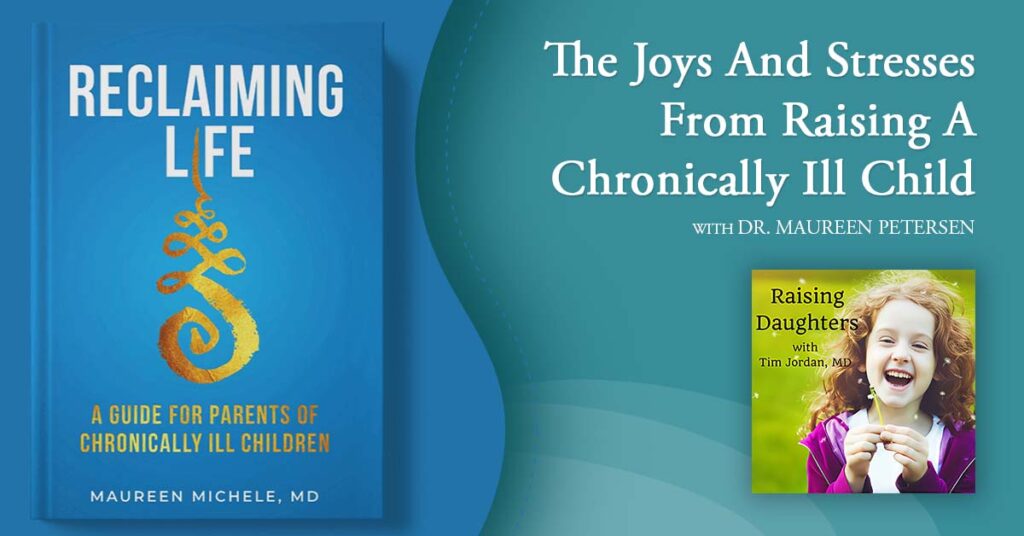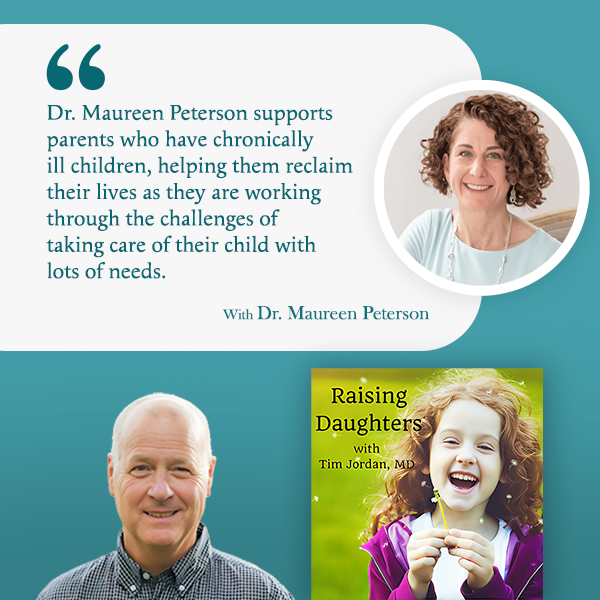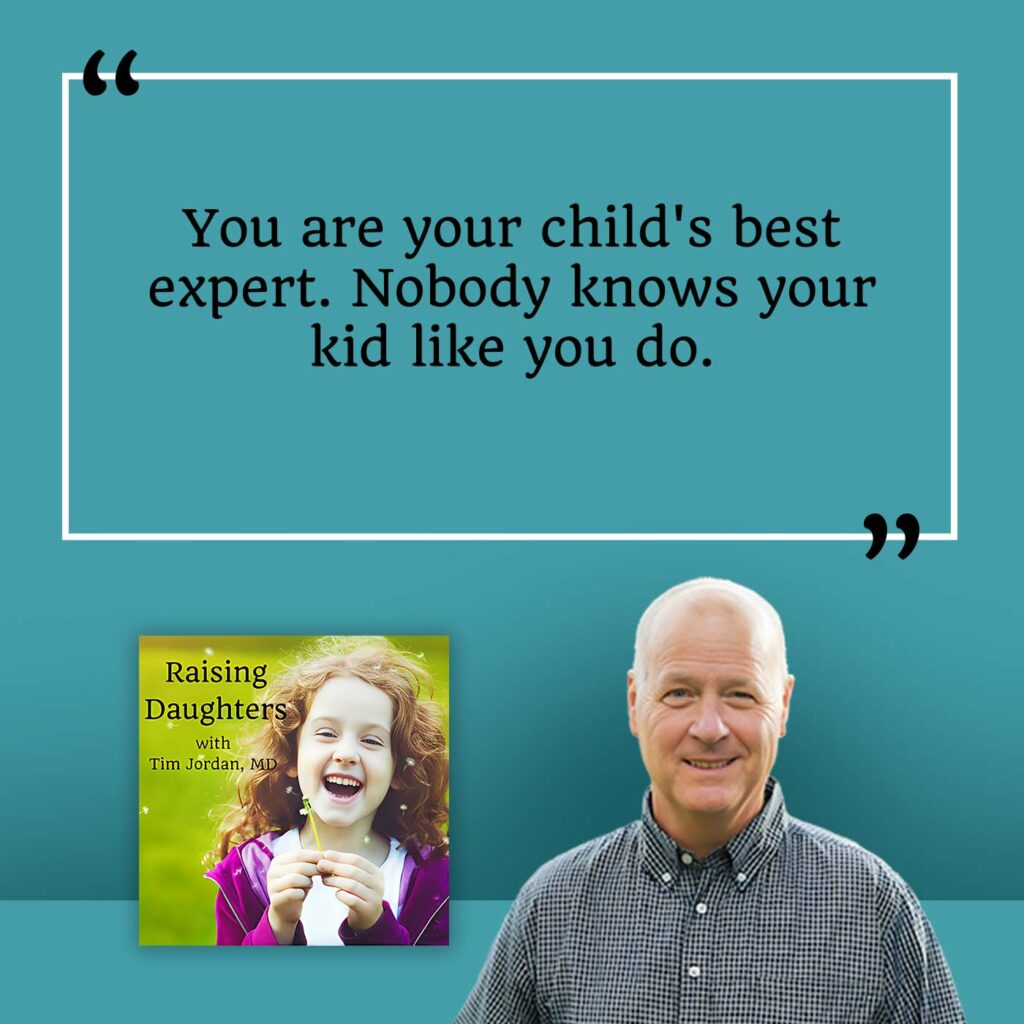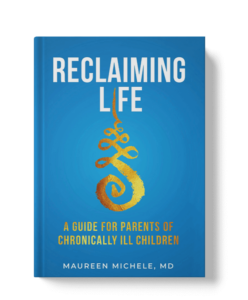
Parenting a chronically ill child teaches us that within life’s challenges lies the extraordinary opportunity for growth, resilience, love, and even self-care. In this episode, Dr. Maureen Peterson, author of Reclaiming Life: A Guide for Parents of Chronically Ill Children, shares the joys and stresses of raising a chronically ill child. Through relatable experiences and heartfelt advice, she touches on the overwhelming emotions parents face, offering strategies to manage stress and advocate effectively for their children. Dr. Peterson emphasizes the importance of self-care for parents, dispelling myths and stereotypes about what constitutes self-care. She also emphasizes that self-care isn’t just about spa days; it’s about nurturing oneself in small, impactful ways that fill the emotional cup. Tune in and learn how to keep the lamp burning for you and your child.
Check out Dr. Jordan’s previous podcast on the vulnerable child syndrome: https://drtimjordan.com/2022/03/parents-overprotective-children-resilience-infertility-addictions-emotions/
—
Listen to the podcast here
The Joys And Stresses From Raising A Chronically Ill Child With Dr. Maureen Petersen
Sometimes, I start to pontificate about some topic that I have some passion for but I also like to have guests on, especially people who have written books and have poured a lot of their energy and passion into something. That’s what we have in this episode. I asked an author. Her name is Dr. Petersen. She’s from North Carolina. She wrote a very interesting book, which I read called Reclaiming Life: A Guide for Parents of Chronically Ill Children. That’s not a topic we’ve addressed that much.
I did a previous episode about the vulnerable child syndrome and ghosts in the nursery. You guys can go back if you haven’t read that before. Her book goes into how parents can reclaim their lives. It’s so time-consuming to have a child who has “issues.” Sometimes, parents get all caught up and lose themselves. I invited Dr. Petersen to the show. First of all, thank you so much for being here.
No, thank you. I’m excited to have this conversation with you and appreciate you for allowing me the time to share my story, tips, wisdom, and whatever we chat about with your audience. Thank you.
Dr. Petersen, like myself, is a pediatrician but she’s an allergy immunologist. She wears lots of hats. She’s a life coach and an author but she specializes in supporting parents who have chronically ill children. She can tell us what that means. She spent her career caring for patients with a variety of acute and chronic health problems. She’s a life coach who works with parents to help them regain their lives as they’re working through the challenges that come with having a child with lots of needs.
She’s also the mother of three. She has experience with having a daughter who has some long-term health issues. Her daughter is a neuroblastoma survivor and also is a Type 1 diabetic. She has lived what she is talking about and is supporting you all about. That also gives her another level of credibility again. I always like to ask my guests how they got to their path.

I work with a lot of young women who are in middle school, high school, and college and who were freaked out like, “I don’t have my whole life figured out. I should know what I’m doing with my whole life.” I’m not sure if your kids are experiencing that. Most people didn’t know when they were 16, 18, or 20 what they were going to be doing when they were 30 or 40 years of age. How did you get to this place in your life where you’re doing what you’re doing?
As a kid, I thought I was going to have a very straight path in my life. I had the dream of being a mom and not only a doctor but a pediatrician. I thought there was a straight line to how I was going to accomplish everything I wanted to in life. I am grateful for being able to achieve those dreams of being a mom and a doctor. During my pediatric residency, my daughter, who was my second-born child, was an infant at the time and was diagnosed with neuroblastoma.
That diagnosis took the carpet right out from under me because I had cared for patients with neuroblastoma. I knew what that meant and what complications there could be with all of this. My brain was off to the races, anticipating all of these bad things happening. My daughter went through surgery, chemo, and the whole work. I went into a very dark place but with time and supportive friends, things got better. I thought I was on this straight journey in life.
When she was twelve, I got to be the physician to diagnose her with Type 1 diabetes in a school bathroom. I immediately felt all of the emotions that I had experienced years earlier when she was an infant. They all came rushing back. This time, as the dust settled on life with diabetes, I realized I needed to be proactive in trying to avoid that dark place that I was at years earlier. I took it upon myself to listen to a lot of podcasts, learn a lot about coaching, and get a coach. It helped me manage my mind through that process.
I continued my career in medicine. I had a leadership role. I was a mentor to a lot of program directors, interns, residents, and fellows. I became a certified life coach to help with that mentorship role. I quickly learned that the tools that I knew how to use with coaching became very powerful in the clinic. I was able to help families even more than I had before. Life, looking back at it, has not been a straight line. It’s been quite a windy road but that’s what life is supposed to be like. It’s not supposed to be this easy, straight line because we would never grow and learn from our experiences.
Life is not supposed to be this easy, straight line because then we would never grow and learn from our experiences. Click To TweetIn your book Reclaiming Life: A Guide for Parents of Chronically Ill Children, chronically ill children can mean a lot of things, I assume.
You know that chronic, that word in medicine means longer than six weeks. When sitting down to write the book, the book was initially being done because my kids always ask me, “Mom, tell us the story of when Kylie was sick with neuroblastoma. Tell us the story of you and Kylie in the bathroom at her school.” I took on the task of writing the book to document the stories for my kids.
In the process of putting the book together, I realized that the stories that I had could help other people. Being able to share with others what we have gone through could make life a little bit easier for somebody else. The gift that that book gave me was I thought I was going to crank the stories out in a weekend because they were at the forefront of my brain. There are stories of patience and stories of my daughter. It took a lot longer to write because it was emotionally exhausting to go back to that point in time.
When I wrote the last sentence of the book, I closed my laptop and started to cry, knowing that I had been healed through the process of retelling all of these moments, understanding and processing the emotions I had gone through over the years. I teach about journaling all the time. It’s no surprise that that happened in writing this book.
One of the challenges that parents have to face is especially if they have a child in the early going, a premature baby, a baby who gets a brain tumor, or a baby is born with Down syndrome. This is true for moms because they’re feeling the baby. They have this vision of what the kid is going to look like and what the baby’s going to be like. We start to create a story about, “This is my picture of me being a mother or a father.” Sometimes, when the baby comes out or in the early going, things happen, or there are challenges, that picture gets put aside because there’s a new picture they have to learn to accept.
Anytime that a child gets a diagnosis, not just the child’s life but the entire family’s life will change. As part of that new diagnosis or challenge, there’s some grieving that does go on to grieve the loss of this life that you had envisioned for yourself and your child. One of the things that I often say is when we’re faced with a challenge in life, whether it be a challenge of a diagnosis or a financial challenge, we have two choices. It’s the choice to sit in a corner and pretend that things are going to go away and allow life to happen to us, or we can choose to turn that challenge into a gift and allow life to happen for us.
That’s hard sometimes in the moment when I was diagnosing my daughter with diabetes. I was trying to put that moment as a gift. It sure didn’t feel like a gift at the time, and that’s normal. I’m not talking about the moment thinking of it as a gift but with time, we can learn a lot from the challenges we’re given in life. Allowing yourself to learn and grow from it is so important.
What I find is that before people can get to that point, there are a lot of emotions they need to process through first. I did an interview with a woman who wrote a book called Night Vision. It’s about our dark emotions. It’s an interesting book. You would probably enjoy it. It’s about all the judgment the culture has about. “You should always be happy. You shouldn’t be anxious or sad. If there are any symptoms like that, it’s a diagnosis. Here’s a medicine. Numb it out and make it go away.” Sometimes, you need to be with those things to say, “What’s it telling me?” Find some healthy ways to process it.
The other thing I would add to that is being with it means labeling it, feeling it, and understanding it but not dwelling on it. A good analogy is when there’s a hot stove. If you put your hand on that stove, you want to feel pain so you pull your hand away. What you don’t want to happen is sit there with your hand and continue to be on the stove feeling that pain that we do to ourselves with negative “emotions.” We stay in this place of these negative emotions without realizing that they’re this signal like the hot stove is in that analogy. You don’t need to be led through the rest of your life by all of these difficult emotions.
You describe in your book that there are lots of feelings that parents go through when they have a child who has a chronic illness. It’s not just the grief or sadness of the child that they wanted. There are a lot of other things like resentment, guilt, and anger. Can you talk about some of those for a moment?
The big one that comes up is overwhelm. There’s so much that they need to learn about the diagnosis and that they’re concerned about. They don’t know about it. There are all the things that need to happen like pharmacy visits, doctor’s appointments, and therapies, along with leading your life, work, family, and other things. Overwhelm is extremely common but any time that we’re talking about emotions, those emotions are coming from thoughts that our brain is generating.
Those thoughts are creating the emotions. Emotions are creating our actions in life. Our actions are giving us results that we see in our lives. If there are emotions that commonly come up like overwhelm, guilt, or fear, it’s because our brain is acting like a broken record with a thought going through it over and over again creating those emotions. I mentioned about journaling.
Journaling is so valuable because it’s an opportunity for somebody to write down what is on their mind and what thoughts are going along in their mind. They’re able to look at them as words on paper. That creates this objectivity that allows an individual to not put judgment on how their brain is functioning but gives them a little bit of clarity and awareness that things are evolving because they’re continuing to think a thought that isn’t serving them well.
A lot of times, people are afraid to share some of that. People think they’re crazy or they shouldn’t feel that. There are judgments about all kinds of emotions we have. It may make it harder for people to do what you’re saying.
Shame and blame are two things that hold us back a lot of the time. If they’re having challenges with sharing their thoughts with someone else, put it on a piece of paper that no one is going to see. Even crumple it up when you’re done and throw it away but the process of giving yourself some space to physically write things down begins to bring a level of awareness and curiosity to how your brain is working.

Some people might need a therapist or a life coach like you to guide the process because they’re overwhelmed. When you’re overwhelmed, nothing makes sense. You’re stuck.
This happens all the time. My youngest is in the middle of exams. He texted me and said, “I am freaking out. I’m so stressed.” One of the things that I said was, “What are you freaking out about?” I got a text back, “I’m freaking out about the exam, the exam that’s next week too, and buying Christmas gifts, everything.” I said, “Take a breath one thing at a time but give your brain a job. If your focus is that exam, make it a game and tell yourself, ‘What it is that I can learn that I haven’t learned yet about this subject matter?’ If you give your brain something to focus on, it will stop the spinning of all the other things that are distractors in the background.”
Another important thing you talk about in your book is how important it is for parents to develop the courage to advocate for their kids. Can you talk about that?
You know this from being in medicine that parents often come into a medical appointment. They have in their mind that a physician is up on a pedestal. They’re talking to somebody who is superhuman and doesn’t make mistakes or have bad days. I teach parents that that is a dangerous thought to have when you’re going in to try to advocate for your child because thinking that you’re not on the same level as somebody becomes something that squashes your courage.
Go into that appointment with the understanding that everybody is human. This healthcare provider or the school official is human. They can make mistakes and have bad days. It is a much better approach. The other thing is that anytime we talk about advocating for our child, people immediately think that it is going to be a fight. They approach it with guns blazing and ready for this battle that they’re going to have.
If you approach it with a very calm set of emotions and curiosity, you create this mutual understanding that goes on to build trust in this relationship. Some of the ways to do that before the appointment if you want to advocate for something is by making a list of the things you want to talk about. If you feel yourself getting anxious or irritated, you look at your list and get yourself back grounded to read off the list. It is very helpful sometimes.
One of the first things on that list might be to own your child’s best expert. Nobody knows your kid like you do. Even though you’re talking to a doctor or a therapist, they’re not with that kid every day. People sometimes have to own that. Another thing is that a lot of moms and women have a problem with this. They’ve been conditioned not to advocate for themselves. They’ve been conditioned to stay quiet and turn all that good girl stuff, which sounds like cliché but it’s still alive and well, unfortunately. They have to fight two things.

For the point that you made about being conditioned not to advocate, this is why I tell parents. When you are advocating, give yourself some grace. It does not need to be perfect every time. You are going to make mistakes but learn from the mistake, let it go, and do better next time. The other thing I tell parents is to have their kids watch when you’re advocating for them because kids learn by watching what their parents do. They learn more than a parent telling them something.
If we can be good advocates and have our kids watch, what a valuable opportunity for a lifelong education there for the child. That’s why my daughter does a great job of advocating for herself because she has watched me do it well and poorly. Having conversations about that afterward has made her a good advocate. Breaking that cycle that you talked about is important.
Someday, they’re going to leave the nest and you’re not going to be there to always be their spokesperson. The earlier, the better. You talk in your book about the importance of self-care. I see a lot of girls in my summer camps and weekend retreats who don’t take care of themselves because they may have a sibling who has autism, a sibling who has issues, or a parent who has issues.
They’ve been brought up to put their needs aside because there’s something more important at the moment. Their autistic brother is having a meltdown or the police are there because they got caught with drugs or something. They developed this belief that other people’s needs are more important and therefore, their needs are not important. I’ve bet a lot of the parents that you work with somehow come to that.
I was in that boat when Kylie was an infant. It didn’t matter what I had on my plate. It was getting cleared and my focus was on her. I want to make it clear. When we talk about self-care, immediately some folks think we’re talking about spa days and yoga classes. Those things are great self-care things. You said it very nicely. It’s putting your needs first. That is self-care. It can be a few minutes of journaling in the morning or meditating for 1 minute or 2. It does not need to be something lengthy.
It can be like going for a long run or a yoga class but it doesn’t need to be something that takes up a lot of time. It’s doing something to fill your cup. That is a necessity when you have a kid who has any health challenges. You cannot parent well if you are not well. Carving out some time in your day for yourself becomes so important. We know this because we fly on airplanes. What do the flight attendants say? They tell us to put on the oxygen mask first. That’s what we need to do on a regular basis and prioritize our needs so that we are a good caregiver for our kids.
Another thing that I find a lot with girls and/or women is having a hard time reaching out and asking for help. You can’t do it alone. The whole culture has conditioned us to be independent and take care of ourselves. There are times in the life of any parent, much less a parent who has a child who has a chronic illness or chronic needs, that is more important.
I have a chapter about this in my book. I mentioned at the beginning that one of my dreams was to be a mom. When my daughter got sick and I needed to have people help me out, asking for help for me felt like I was failing as a mom. There was no way that I was going to fail at my childhood dream. It impacted my ability to ask for help, which I didn’t do very well at that time.
I now know through practice that asking for help is important because it shows that you are prioritizing your needs. It demonstrates that you’re doing a good job with self-care like we were chatting about but the other thing is the person who’s giving the help, it gives them this opportunity to fill their cup. People enjoy helping each other. Why would we not want to give someone a chance to provide a service?

You have a beautiful quote from Mother Teresa in your book. It says, “To keep a lamp burning, we have to keep putting oil in it.” I’d never heard that one before. I’m going to use that in my talk somewhere along the line. One of the biggest challenges that parents who have a child with chronic needs is the letting go piece. I have a girl who I’ve been seeing. She’s in high school. She had an Arnold-Chiari malformation and they discovered it as a baby. She needed a couple of surgeries.
Ever since that time, there’s been a black cloud above her head in her mother’s eyes. If this girl coughs or does anything, the mother goes right back to, “Here we go again.” It’s been so hard for her to see her daughter being okay and able to take care of herself, and thus launch. She’s a senior in high school. It’s time for her to launch.
That happens over and over with vulnerable child syndrome. That’s a setup for it. You can break that cycle as a parent by becoming aware of the results that it’s giving you in your life. For the example that you gave, that mom is being led by fear and is not going to be able to do some of the things that she wants to in her life because she’s so worried about her daughter. I am not going to say that fear will ever go away because, as a parent, we all worry about our kids. We worry that they’re not going to be home for curfew.
When we can’t get ahold of them, we worry that something bad has happened to them. There’s always this fear that is there. It’s the important realization that fear doesn’t need to lead us in our lives. Don’t let it be in the driver’s seat of your car and journey in life. Have it go into the trunk and go along for the ride. It’s going to be there but you can control it. It goes back to the analogy we were talking about with the hot stove. Take your hand off the stove. Don’t sit there and become so overwhelmed with fear that you’re not living your life to its fullest. You do a better job of parenting when you are living.
Don't sit there and become so overwhelmed with fear that you're not living your life to its fullest. You do a better job of parenting when you're actually living. Click To TweetIn my last year of fellowship training in Boston, my mentor was Dr. T. Berry Brazelton. One of the things he always said when it comes to feelings is, “What is unexpressed becomes unmanageable.” Like the vulnerable child syndrome, these feelings and fears are normal. If we normalize it, a lot of times, it can be put in the trunk of the car so it doesn’t lead us. That’s a nice way of putting it.
Normalizing it is important but even before normalizing, it is labeling it. Saying, “I am scared that this Arnold-Chiari malformation is causing this problem.” The power of labeling can do a lot. Normalizing that we all experience fear around our kids is part of the human experience and allows us to let it go, get over it, and be able to lead a life with it along for the ride.
Before we close, I want you to talk for a minute about something that you call BULLY and how parents can put their experience in perspective. Bully not like a schoolyard bully. Is it an acronym?
I don’t have the acronym in front of me but yes, it is an acronym. It’s to understand that emotions are something that we can bring awareness and curiosity to, and not allow things to beat us up. We can choose what thoughts our brain is recirculating to allow us to move into a different emotional space.
Why are you the perfect person for this to happen to? As opposed to saying, “Why is this happening to me?” That’s one of the shifts.
It goes back to what I was saying about challenges in life. Looking at a challenge as an opportunity to grow and learn is important. When I was experiencing everything with my daughter, we went through the whole cancer thing and then the diabetes thing fell on top of it. I kept thinking at the beginning, “This cannot be happening. We checked that box of a bad thing happening. Why is this other bad thing happening again?” It’s the realization that this is happening exactly the way that it’s supposed to in life. There’s the opportunity for us as parents to learn and grow from the challenges that life is presenting to us. We are the perfect person to be the parents to our children when a challenge arrives.
There's the opportunity for us as parents to learn and grow from the challenges that life is presenting to us, so we are the perfect person to be the parent to our children when a challenge arrives. Click To TweetThis is an unfair question but if you had to boil down your book, what’s the most important thought lesson awareness you could hand to a parent who has a child who has a chronic illness?
Everything is going to be okay. That sums up what we’ve been talking about. Life is going to have challenges. We have the opportunity to make those challenges into a gift. We have the opportunity to grow and learn through all of these challenges. Sometimes, it takes a little bit of practice and some time away from the immediate event to see what the gifts or the learning can be but they’re there. Life’s going to be okay. Taking a step to make yourself move in the right direction is also important. That first step is the hardest.
How can people get ahold of you?
My website is the best way to get ahold of me. It’s MaureenMicheleMD.com. My book is on Amazon. It’s under the author name, Maureen Michele.
I noticed on your website that you do a lot of things. You do one-on-one coaching, group coaching, workshops, keynotes, and give talks at seminars. You do a lot of things to get your information out.
I hope your audience sees that I’m passionate about teaching and making sure that someone’s journey in life is a little bit easier than what I went through. If I could use my teaching skills, stories, and experience to do that, I would do it a million times over. Coaching, whether it be one-on-one and group coaching or speaking engagements, allows more people to learn from what I have learned in life.
Thank you so much for being on the show and for your book, which is called Reclaiming Life: A Guide for Parents of Chronically Ill Children. It’s full of lots of good information, insights, and awareness. Anybody who was a child who had any struggles would get a lot out of it.

Thank you. I appreciate being here and chatting with you but I also appreciate you for reading my book and sharing things about it with your audience. I love the work that you do. Thank you for having me on your show.
Thanks so much.
—
That was a good interview. I’m glad I got a chance to read her book and have her on the show because there are a lot of people who have kids who have challenges and who have chronic illnesses. It could be things like depression, learning disability, asthma, or diabetes. They were premier kids who struggled in lots many different ways. Parents need support and understanding to help them through those tough times. There are unique challenges with having a child who has challenges like that. I appreciate Dr. Petersen for giving us the information. I’ll be back here with something else for you. I’m not sure what yet. I hope you enjoy these and you pass this on to your friends, especially if you have a friend who has a child who has a chronic illness or some needs. Thanks so much for stopping by.
Important Links
- Reclaiming Life: A Guide for Parents of Chronically Ill Children
- Previous Episode – Why You Might be Overprotective and Overinvolved in Your Children’s Lives
- Night Vision
- MaureenMicheleMD.com